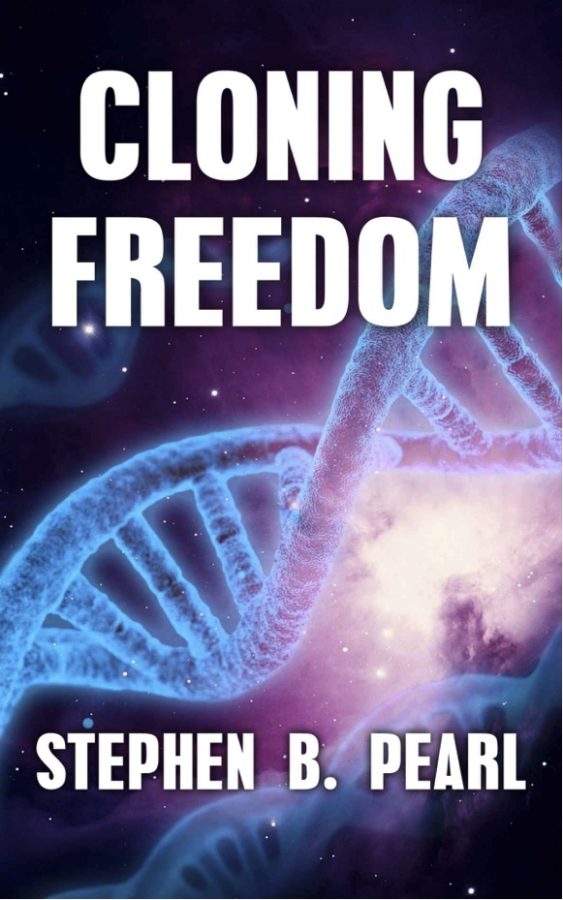Genre: Sci-Fi, Space Opera
Reviewer: Lee
Get It On Amazon
About The Book
In the early 21st century, Rowan is fighting a secret war against alien pirates bent on subjugating all of mankind.
At least, that’s what she thinks. In reality, it’s a thousand years later, Earth has long been part of an interstellar and interspecies republic, and she’s a character on Angel Black, an e-entertainment that allows viewers a complete sensory experience through her perspective. Who needs actors when you can clone famous performers and splice in some alien DNA? Since studio clones have no rights, their lives and experiences can be tailor-made for the program.
It’s just too bad the clones don’t know that.
Ryan Chandler was a decorated war hero until he was cloned to save his life. His career options died with his original body and the best job he can get is a technician on Angel Black. He’s planning to escape to a newly colonized system when Rowan is scheduled to be killed off.
With help from unexpected allies, Ryan stages Rowan’s rescue, but getting her off the set is only the beginning. To succeed, they must evade a manhunt supported by the state that fears Rowan’s liberation might be the triggering event of a clone rights movement that could cost the establishment billions and shake the foundations of human society.
Can two clones find their freedom in a society that treats them as second-class citizens?
The Review
Cloning Freedom, by Stephen B. Pearl is a caper of rare energy and pacing. It is a wonder that it avoids descending into camp. But it doesn’t. Pearl’s story may orbit the ludicrous, but it avoids a fatal trajectory down the gravity well. Instead, we have a smart, funny, satirical sci-fi romp.
It is the future, and the information age has passed. The new experience age needs cheap disposable dupes to feel it for a new, ever lazier, you. Pearl throws the reader into the middle of the action on an entertainment show called Angel Black, whose actors—all clones—are unknowingly affected by producer controlled nanobots that both transmit their emotional responses and manipulate their brain chemistry. Viewers see and feel everything that happens to the disposable clone actors. Philip K Dyck wrote We Can Remember It For You Wholesale, but Stephen Pearl suggests what we really might want are slaves to feel it for us. All the better because we can jack up their emotions and sexuality for the ultimate voyeuristic experience.
The clones of course have no idea that they: (a) are clones, (b) are being recorded, (c) are being manipulated, (d) are living on a set instead of the real world, and (e) have no rights whatsoever. The clones are not all human. Sentient otter, cat and bat-like aliens abound in an action packed, over-sexed drama whose production can at any time see any of these “fakeys” killed on the whim of the producers. Beautiful and sensitive Rowan has been chosen to die by cruel producer John, but technician, Ryan, a former war hero has decided to save her. All this happens in the first few fast paced pages, so many readers will be checking their seatbelts and reading some parts twice.
Pearl’s story is not hard sci-fi, but what technical detail he does share is quite good. His characters are gray. Even the incredibly earnest protagonist takes creepy liberties that many readers will question. This is a wise handling of character. It is easy—and lazy—to write every character as perfectly good or evil, and too easy to allow the reader to moralize and say that “I would never do that dark deed.” It is far better to do as Pearl has and have some nuance and imperfection. After all, most of the moral choices in real life are just as gray and subtle, particularly when the little evils we do are ingrained in our everyday lives.
Layer upon layers of manipulation and Geppetto-like string pulling unfold as the story proceeds, and the reader is left to wonder if the good characters are who they portray themselves to be. Although this intriguing question was relaxed—perhaps too much—to achieve a happy ending in the final third of the book, I still wondered about it. In a world of slavery, can there be heroes, or does everyone exploit everyone else to some degree? It is important to note that although many of the characters and societies in Cloning Freedom exploit slavery, the author does not. This may seem a strange point, but it is not uncommon for an artist to also exploit their art. Not so here. The story may be darkly funny, but it never loses its point.
Takeaway: This is a fast paced, satirical, sci-fi story about living vicariously through slaves. Cloning Freedom fits somewhere on the spectrum of The Truman Show and We Can Remember It For You Wholesale but with a frenetic pace, gonzo humor, militaristic flavor and gentle landing.
In accordance with the author’s entirely reasonable convention for Cloning Freedom, boldface font is used in this review instead of italics.
The Reviewer
Lee has a background in physics and applied science, but has always enjoyed reading fiction. His first serious forays in writing came from dungeon mastering and high school drama club, although for nearly three decades as a geophysicist, he wrote only non-fiction. At the age of 25, Lee spent a prolonged period of time on the edge of death, had the last rights read to him, and enjoyed several near death experiences. Not even all the morphine could make him forget those. Lee enjoys rock climbing, cycling, hiking, swimming and writing. He is an Ironman Triathlete.


